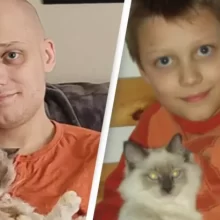I’ve Only Got Six Months to Live After Doctors Dismissed My Symptoms
The post I’ve Only Got Six Months to Live After Doctors Dismissed My Symptoms appeared first on Healthy Holistic Living.
When 34-year-old Sophie Louise Wright began experiencing unusual health symptoms, she never imagined that these minor disturbances could foreshadow a life-changing diagnosis. Initially dismissed as nothing more than a common digestive complaint, Sophie’s persistent health issues led her on an unexpected journey through the complexities of medical diagnostics. This story isn’t just about a medical condition; it’s about a young mother from Torquay, Devon, facing her greatest fears with courage and determination. As we uncover her experiences, we uncover not only the shocking twists of her diagnosis but also the emotional and psychological battles that accompany a grave illness. Join us as we explore the twists and turns of Sophie’s compelling story, revealing the profound impact of her diagnosis on her life and the lives of those she loves.
The Shocking Diagnosis
Sophie Louise Wright’s health journey began innocently enough, with symptoms so common that they could easily be mistaken for minor ailments. Experiencing pain under her ribs and bouts of nausea, Sophie initially wrote them off as typical post-surgical effects, having recently undergone surgery to remove benign polyps from her intestines. However, as her condition worsened, the usual explanations no longer seemed to fit the bill.
Initially, doctors reassured Sophie that her symptoms were likely due to acid reflux or possibly a stomach ulcer—common issues that are often managed with medication and minor lifestyle changes. Armed with anti-sickness tablets, Sophie expected a swift return to normalcy. But as weeks turned into months with no improvement, the reality that something was seriously wrong began to set in.
The turning point came when relentless pain and unexplained bleeding prompted more rigorous investigations. Despite previous biopsies returning negative, a series of blood tests, CT scans, and an MRI eventually uncovered the harsh truth: Sophie was suffering from advanced bowel cancer, which had already begun to spread to her liver and spine. This diagnosis not only confirmed her worst fears but also highlighted a devastating oversight in her initial medical assessments.
The news struck Sophie like a thunderbolt, leaving her to grapple with the enormity of her condition and its implications. Suddenly, she found herself facing a timeline no one is ever prepared for, with just six months to plan a lifetime’s worth of moments.
What is Bowel Cancer?
Bowel cancer, a prevalent health concern in the UK, presents a complex challenge to both patients and healthcare systems. As the fourth most common cancer in the UK, it affects a significant portion of the population, with about 42,900 new cases reported annually (Cancer Research UK). Despite stable incidence rates over the past few decades, bowel cancer remains a major cause of morbidity and mortality.
Common Symptoms and Diagnosis
Bowel cancer commonly manifests with symptoms such as changes in bowel habits, blood in the stool, abdominal pain, and unexplained weight loss. These signs often prompt further diagnostic investigations like colonoscopies, which are crucial for early detection. Early diagnosis significantly improves survival rates, underscoring the importance of awareness and timely medical consultation.
Statistical Overview and Mortality Rates
Although incidence rates for bowel cancer have slightly decreased, the disease’s impact remains profound. According to Cancer Research UK, each year, approximately 16,800 people in the UK succumb to bowel cancer, making it the second most common cause of cancer death. Mortality rates are highest among the older population, particularly those over 75 years of age, who constitute nearly 58% of all bowel cancer deaths. Thankfully, due to advances in medical treatments and screening methods, the overall mortality rates have been on a gradual decline.
Advances in Treatment and Prognosis
The treatment landscape for bowel cancer includes a combination of surgery, chemotherapy, radiotherapy, and, in some cases, targeted therapies. These treatments have evolved significantly, improving survival outcomes. For instance, over the past 50 years, the survival rate has more than doubled, with more than half of the patients now surviving ten years or more after diagnosis.
The introduction of bowel screening programs has also played a pivotal role in improving prognosis by detecting the disease at an earlier, more treatable stage. Such programs are vital in decreasing both the incidence and severity of late-stage bowel cancer presentations.
The impact of early detection on survival cannot be overstated. With current medical advancements and screening techniques, the potential for managing bowel cancer effectively and improving patient outcomes is greater than ever. However, the challenge remains to ensure widespread awareness and participation in screening programs, which are crucial in the fight against this formidable disease.
The Struggle Beyond the Diagnosis
Sophie Louise Wright’s battle with bowel cancer brings to light not only the physical toll of the disease but also the profound emotional and logistical challenges that accompany such a diagnosis. Her treatment regimen includes chemotherapy, immunotherapy, and radiotherapy, a common trio in the fight against aggressive cancers. Despite these efforts, the cancer has spread to her liver and spine, complicating her treatment and prognosis.
Sophie has turned to an innovative treatment option in Germany that involves delivering chemotherapy directly into the liver. This targeted approach aims to shrink the tumors more effectively by concentrating the treatment on the cancer cells while sparing the rest of the body from the harsh effects of systemic chemotherapy. The cost of this treatment is substantial, with each session priced at $4,107, and an estimated ten sessions required for optimal results. The financial burden of such treatments is immense, prompting Sophie and her fiancé to fundraise to cover the costs.
Living with terminal cancer affects more than just the patient; it impacts every relationship they hold dear. Sophie’s condition has strained her relationships with her daughter and fiancé, as the daily realities of her illness make regular family interactions and responsibilities challenging. Her role as a mother and partner has been overshadowed by her fight for survival, altering the dynamics of her family life. The psychological impact of such a disease is substantial, often leading to feelings of helplessness and despair, which Sophie bravely confronts every day.
The mental and emotional impact of a cancer diagnosis can be as debilitating as the physical symptoms. Patients often report feelings of anxiety and depression, grappling with the uncertainty of their prognosis and the fear of what lies ahead. For Sophie, the thought of her young daughter having to grow up without her mother is an unbearable emotional burden. These psychological battles are a critical aspect of cancer treatment, highlighting the need for comprehensive care that includes psychological support and counseling.
Sophie’s story is a poignant reminder of the harsh realities faced by those battling terminal illnesses. It underscores the importance of support, both medical and emotional, for patients and their families during these incredibly challenging times.
The Mystery of Rising Bowel Cancer in Young Adults
The increasing incidence of bowel cancer among individuals under 50 is a concerning trend that has caught the attention of researchers and healthcare professionals worldwide. Various studies suggest a mix of lifestyle factors and environmental exposures as potential catalysts for this rise, particularly in younger populations.
Alarming Trends and Risk Factors
Research indicates that the rate of colorectal cancer has been climbing steadily in younger adults since the 1990s, with a significant rise noted in individuals under 50. This increase is not just a matter of improved detection methods but also aligns with shifts in lifestyle and dietary patterns over recent decades. Factors such as obesity, sedentary lifestyles, and diets high in processed foods and sugars have become more prevalent and are strongly implicated in the rise of early-onset colorectal cancer.
In addition to lifestyle changes, environmental factors are under scrutiny for their potential role in the increasing rates of bowel cancer among the young. Exposure to certain chemicals in the environment, which may include pesticides and industrial pollutants, has been suggested to contribute to early-onset colorectal cancer. These substances may cause genetic mutations or alter the gut microbiome in ways that increase cancer risk. Moreover, the concept of the ‘birth cohort effect’ suggests that each successive generation may be exposed to risk factors earlier in life, thus increasing their risk of developing cancer at a younger age.
While the rising incidence is alarming, it underscores the importance of early detection and prevention strategies. Lowering the recommended age for colorectal cancer screenings is a step some organizations have taken to catch the disease earlier in younger populations, potentially improving outcomes through early intervention.
This rising trend in bowel cancer among young adults highlights a critical need for comprehensive research into its causes, aiming to develop targeted prevention and treatment strategies that address both the lifestyle and environmental factors at play.
Tips for Prevention and Early Detection
As we navigate the complexities of bowel cancer, particularly among younger adults, it’s crucial to focus on preventive measures and the importance of early detection. By adopting healthier lifestyles and being vigilant about screening, individuals can significantly impact their long-term health outcomes.
Diet and Lifestyle Adjustments
High-Fiber Diet: Incorporate a variety of fiber-rich foods such as whole grains, legumes, fruits, and vegetables into your daily meals. A fiber-rich diet is associated with a lower risk of developing bowel cancer.
Limit Processed and Red Meats: Reduce the intake of processed foods and red meats, which have been linked to an increased risk of colorectal cancer.
Maintain Healthy Weight: Obesity is a known risk factor for many types of cancer, including bowel cancer. Maintaining a healthy weight through diet and regular exercise can help reduce this risk.
Regular Physical Activity
Stay Active: Engage in regular physical activity. Moderate exercise, such as brisk walking for 30 minutes a day, can help lower the risk of cancer and other chronic diseases.
Alcohol and Smoking
Limit Alcohol Consumption: Alcohol has been linked to an increased risk of several cancers. Limiting alcohol intake can reduce these risks.
Avoid Smoking: Tobacco use is a significant risk factor for many cancers, including bowel cancer. Quitting smoking will improve your overall health and reduce cancer risks.
Screening and Early Detection
Regular Screenings: According to recent guidelines, screening for colorectal cancer should start at age 45 for those at average risk. This can include various methods, such as colonoscopies and fecal occult blood tests.
Family History and Genetic Testing: If you have a family history of bowel cancer, consider discussing genetic testing and earlier screening with your healthcare provider.
Be Aware of Symptoms
Monitor Changes: Pay attention to changes in bowel habits, such as persistent diarrhea or constipation, and watch for signs like blood in the stool or unexplained weight loss. Early consultation for any symptoms can lead to timely diagnosis.
These preventive tips highlight the importance of lifestyle choices in cancer prevention and underscore the critical role of early detection in improving survival rates. By staying informed and proactive about health, individuals can significantly mitigate the risk of bowel cancer and enhance their quality of life.
The Personal and Collective Fight Against Bowel Cancer
Sophie Louise Wright’s battle with terminal bowel cancer illuminates the profound emotional and physical challenges faced by those diagnosed with this severe disease. Her story not only raises awareness about the importance of early detection and the potential warning signs of bowel cancer but also underscores the urgent need for advancements in treatment and supportive care.
Sophie’s journey highlights the critical role that personal stories play in raising awareness about health issues. By sharing her experiences, Sophie has opened a dialogue about the importance of listening to one’s body and advocating for comprehensive medical evaluations when symptoms persist.
The ongoing research into bowel cancer, particularly its rising incidence among younger adults, emphasizes the need for continuous exploration into its causes and treatments. Funding for research is vital for developing new therapies and improving existing ones, which could extend life and improve the quality of life for patients like Sophie.
For those battling bowel cancer, the support from the community, healthcare providers, and family is invaluable. It is crucial for patients to have access to counseling and support groups, which can offer emotional sustenance and practical advice during their treatment journey.
Sophie’s story is a call to action for all of us to support cancer research and advocacy groups. It also reminds us of the importance of cancer screening and early detection, which can save lives. Let us honor Sophie’s courage by contributing to the fight against bowel cancer, supporting patients, and spreading awareness about this devastating disease.
Sophie’s narrative is more than a medical case; it is a poignant reminder of the unpredictability of life and the resilience of the human spirit. Her fears for her daughter’s future without her presence are a powerful message about the personal stakes of medical advocacy and the ongoing battle against cancer.
The post I’ve Only Got Six Months to Live After Doctors Dismissed My Symptoms appeared first on Healthy Holistic Living.












